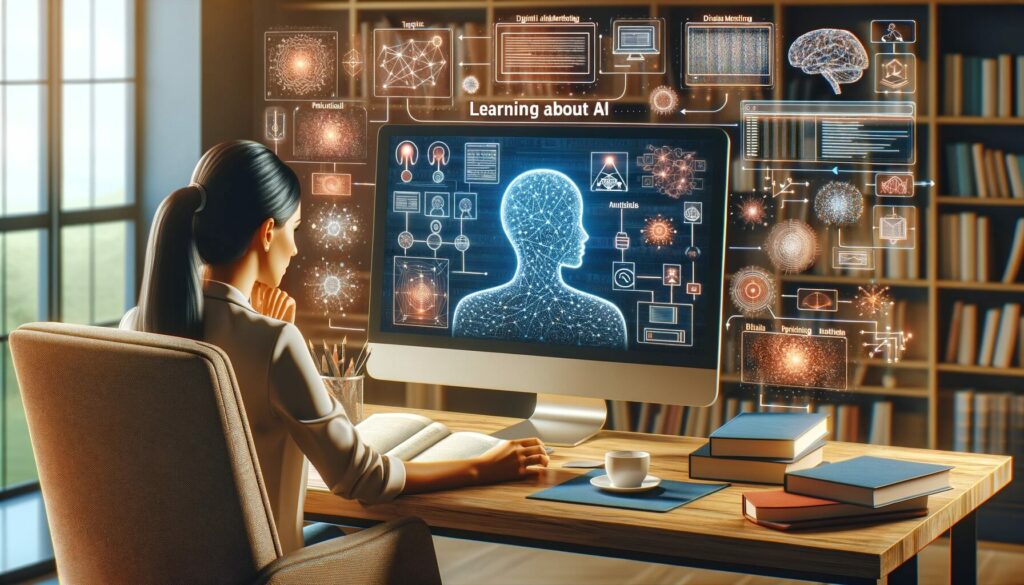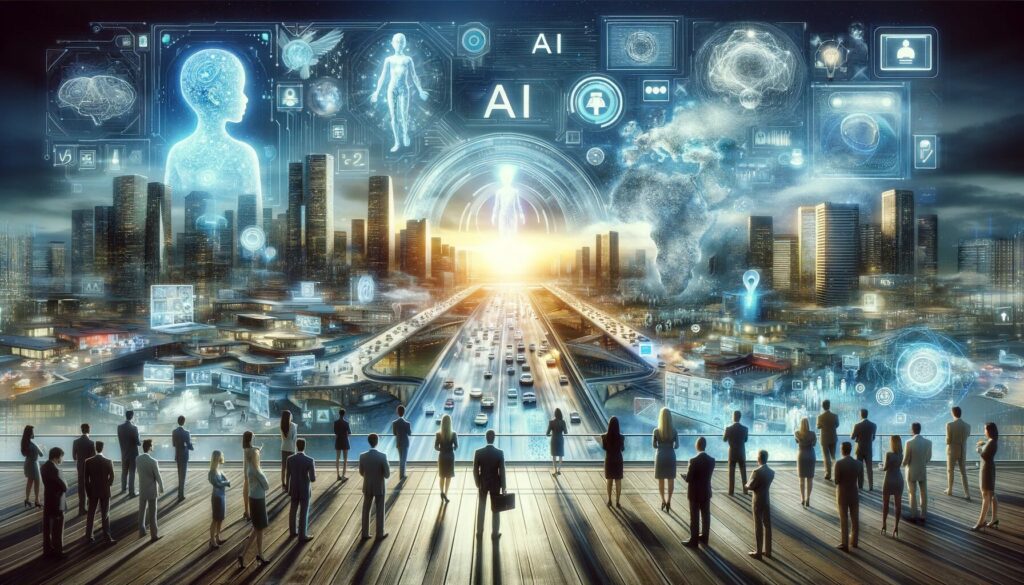Introduction to AI in Digital Marketing

Definition of AI and its relevance in the digital marketing field
Artificial Intelligence, often simply known as AI, refers to computer systems or machines capable of performing tasks that usually require human intelligence. In the realm of digital marketing, AI is becoming an essential tool, empowering marketers to better understand their audience, develop more effective campaigns, and boost ROI.
Overview of how AI technologies are revolutionizing digital marketing strategies
AI technologies are pushing the frontiers of what’s possible in digital marketing in many exciting ways:- **Automation**: AI enables automation of repetitive tasks such as scheduling posts, sending emails, and generating reports, freeing marketers to focus on more strategic tasks.
– **Data Analysis**: AI surpasses humans when it comes to analyzing large datasets. By identifying patterns and insights in data, AI fuels data-driven decision making in marketing.
– **Personalization**: AI uses data to personalize content and offers for each user, drastically improving customer engagement and conversion rates. In the following sections, we’ll delve deeper into these benefits and discuss the challenges that come with implementing AI in your digital marketing strategy.
Benefits of AI in Digital Marketing

Today, companies across the globe are integrating AI technologies to improve their digital marketing efforts. The benefits of this evolving technology are numerous.
Automation of repetitive tasks
One of the key benefits of AI in digital marketing is the automation of repetitive tasks. It handles time-consuming work such as posting regular updates, managing emails and scheduling content, freeing up marketers to focus on more strategic responsibilities. Here are some key points:- AI can schedule posts across multiple platforms at optimal times.
– Marketing emails can be sent en masse, with AI ensuring personalized content.
– AI maintains a consistent brand delivered promptly, which is critical in maintaining customer engagement.
Improved data analysis capabilities
AI’s improved analysis capabilities help in deciphering complex customer data. This information informs marketers which strategies work best to optimize their campaigns. Few points to note:- AI algorithms can rapidly analyze vast amounts of data and find patterns or trends.
– The results offer valuable insights about customer behaviors, preferences, and demands.
Personalized customer experiences through AI-powered chatbots and recommendation systems
AI technologies like chatbots and recommendation systems are essential for providing personalized experiences. Here’s why:- Chatbots provide instant customer service, resolving queries and engaging users around the clock.
– Recommendation systems enhance shopping experiences by suggesting products based on individual preferences, similar to how Netflix or Amazon recommends content. In summary, AI’s efficiency, advanced data analysis, and personalization capabilities are proving to be undeniable assets in digital marketing.
Use Cases of AI in Digital Marketing

AI is making waves in different areas of marketing, and for good reasons! Let’s break down some of the significant ways AI technologies are being put to good use in digital marketing.
AI-powered content creation and curation
AI has the uncanny ability to generate data-driven content, ensuring it is not only relevant but also engaging for the audience. Tools like Articoolo and Quill are leading the charge in this arena. They create cohesive narratives from structured data, freeing up valuable time for content marketing teams.- Articoolo: This tool can produce an article on a selected topic within just a few seconds.
– Quill: This platform excels when it comes to analyzing data and presenting it in an easy-to-understand, narrative format.
Predictive analytics for better campaign performance
Predictive analytics is another impactful application of AI in digital marketing. As marketers, we aim to foresee how customers might behave in the future. AI-fueled predictive analytics tools offer probabilities for customer behaviors based on historical data, helping you optimize your campaigns better.
AI-driven targeting and segmentation
AI makes it easier to identify and target specific customer segments. Not only it speeds up the process of analyzing huge data sets, but also provides deeper insights. This allows for more personalized and relevant marketing communications, enhancing audience engagement. Tools like Optimizely and Google’s AI-driven algorithms are prime examples of AI’s capabilities in this area.
Challenges of Implementing AI in Digital Marketing
Despite the many benefits, incorporating AI technologies into digital marketing also presents several distinctive challenges that need to be addressed.
Data Privacy and Ethical Considerations
One of the major concerns is data privacy. While AI systems use customer data to improve personalization and user experience, the process can infringe upon their privacy if not done responsibly. Thus, it is incumbent on businesses to ensure transparency about data collection and usage. Ethical considerations are also at play here – misuse of AI in terms of invasive advertising or manipulation can seriously damage a company’s reputation.
Fear of Job Displacement Due to Automation
Many people fear that AI might result in loss of jobs as routine and repetitive tasks are automated. However, while AI does automate certain tasks, it often opens up opportunities for more advanced and analytical roles. It is essential to remember that AI is not necessarily a job-killer, but a job-evolver.
Complexity of AI Implementation and Integration with Existing Marketing Systems
Finally, implementing AI can be a complex process. It requires significant time, skilled personnel, and budget allocation. Moreover, integrating AI into existing marketing systems can present technical difficulties and may require substantial changes in workflow and processes.
• Dedicating resources for staff training
• Adjusting the existing marketing strategies
• Testing AI compatibility with the current system
• Regularly updating and debugging the AI applications. Despite these challenges, the potential benefits of AI in digital marketing make it a compelling proposition. Let’s take a closer glance at these benefits in the next section.
AI Tools and Technologies for Digital Marketing

It’s important to understand the specific tools and technologies that pop the clutch behind AI in digital marketing. These evolving mechanisms bring efficiency and accuracy to the table, changing the game for how marketers function.
Natural Language Processing (NLP) for sentiment analysis and chatbots
One extraordinary tool is Natural Language Processing (NLP). Used primarily for sentiment analysis, NLP gauges customer opinions and emotions by interpreting the language used by people. It brings significant value to social media marketing where monitoring comments, reviews, and posts is crucial. In turn, chatbots utilize NLP to simulate human interactions, offering a personalized and immediate response to customer queries.
Machine learning algorithms for predictive analytics and customer segmentation
Machine learning also plays a critical role. It enables predictive analytics, forecasting customer behavior, and trends based on historical data. Moreover, it assists in customer segmentation, grouping similar customers together for targeted marketing. This helps in managing both one-off campaigns and ongoing customer relationship management.
AI-powered advertising platforms and recommendation engines
Finally, AI-powered advertising platforms have been game-changers, enabling real-time bidding and programmatic advertising for maximizing ad performance. Plus, AI recommendation engines offer personalized suggestions to customers based on their past behavior and preferences, defining a new era of personalized marketing. In essence, AI technologies are the magical wand that every digital marketer needs to create impactful and efficient strategies.
Case Studies: Successful AI Implementations in Digital Marketing
Understanding AI’s potential is easier once we take a closer look at real-world examples. Let’s examine how some well-known digital pioneers – Netflix, Amazon, and Spotify – have successfully implemented AI in their marketing efforts.
Netflix’s recommendation system
Netflix uses AI to improve its recommendation system, which in turn enhances user experience and retention. By analyzing user data such as viewing history, ratings, and preferences, the AI system can suggest shows and movies tailored specifically to the viewer’s tastes. This highly personalized approach leads to an impressive uptick in engagement and subscription renewals.
Amazon’s personalized email campaigns
Amazon’s innovative use of AI extends to their personalized email campaigns. Employing AI allows Amazon to analyze data from millions of transactions to share personalized product suggestions and promotional offers to their customers. These personalized recommendations generate significant click-through rates, which benefit Amazon’s overall marketing strategy.
Spotify’s personalized playlists
Similarly, Spotify uses AI to enhance the user’s music listening experience. Through pattern recognition and data analysis, Spotify understands listeners’ behavior and preferences, and responds by generating personalized playlists like “Discover Weekly” or “Daily Mix.” Not only do these playlists keep users engaged, but they also introduce listeners to new music, promoting longer play times and higher user satisfaction.
Future Trends in AI and Digital Marketing

The realm of digital marketing is rapidly innovating with AI technologies being at its forefront. With several exciting trends on the horizon, let’s delve deeper into these advancements.
Advancements in AI technologies and their impact on digital marketing
AI technology is continually advancing, with exciting new development areas like machine learning, predictive algorithms, and natural language processing. These advancements are enabling more efficient and intelligent marketing strategies. For example:- Machine Learning algorithms can analyze customer behavior patterns and predict future purchasing habits.
– Natural Language Processing enhances the understanding of consumer queries, helping businesses target their advertisements more effectively.
The role of AI in voice search optimization and virtual assistants
AI also plays a significant role in voice search optimization, with virtual assistants like Amazon’s Alexa, Google Assistant, and Apple’s Siri becoming increasingly popular. Voice search optimization using AI allows businesses to meet the growing demand for voice-enabled search functions and tap this emerging market.
The potential of AI for hyper-personalization and real-time analytics
AI holds immense potential in personalizing customer experiences and providing real-time analytics. Hyper-personalization thanks to AI can offer tailored content, product recommendations, and personalized offers to customers. Meanwhile, AI-powered analytics provide real-time insights that enable immediate adjustments to marketing strategies. This level of personalization and real-time data analysis would be impossible to achieve manually, thus underscoring the importance of AI in digital marketing.
Conclusion

Recap of the key points discussed
To wrap it up, AI truly pierces the heart of digital marketing with its capability to automate repetitive tasks, analyze enormous quantities of data, and provide personalized customer experiences.
• Automation curbs time-consuming tasks, thus allowing marketers to focus on strategy and creative aspects.
• Data analysis, powered by AI, revolutionizes the way marketers interpret and act upon vast amounts of consumer information, equipping them with proactive measures to overcome market challenges and create targeted campaigns.
• Personalizing customer experiences is yet another advantage given by AI, where users get suggestions based on their behavior and preferences, enhancing their experience and encouraging brand loyalty.
Emphasis on the transformative power of AI in digital marketing
It’s worth reiterating that AI is not just a tool, but more of a game-changer steering the course of digital marketing. By shifting the focus from mass marketing to individualized conversations, marketers can now engage with customers on a more personal level, thanks to AI.
Final thoughts on the future of AI and its impact on the industry
The future of digital marketing is intriguing and challenging with the ever-evolving AI technologies. As we continue to uncover new dimensions of AI, its role in crafting more targeted, interactive, and human-like digital marketing strategies will continue to grow. The AI revolution is here, and it’s reshaping the digital marketing landscape in ways we couldn’t have imagined just a few years ago. To stay abreast, every marketer needs to embrace and effectively utilize AI for their campaigns. Long story short, AI is here to stay, and it’s high time to hop on the bandwagon and enjoy the ride!




